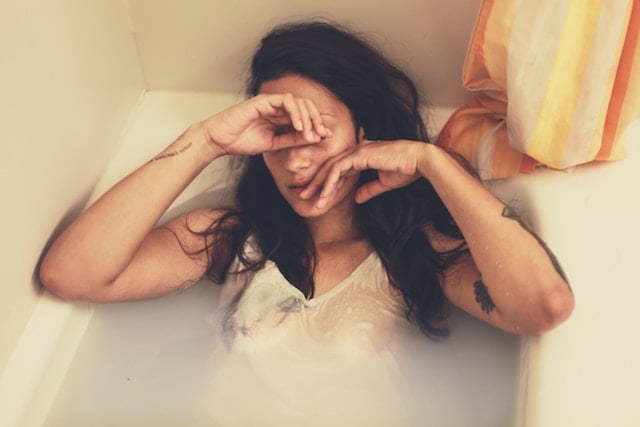A few weeks ago, a woman who lived in a nearby community walked into the autumn woods and took her own life.
I didn’t know her, but I was glued to her story, which also made our local and national news. She left behind a child, a husband, a brother, parents, and loads of loving friends.
Her death affected me deeply, because I got it.
I know what it’s like to struggle with anxiety and depression. I know what a heavy, heavy load we’re all carrying these days. I know how hard it is to balance work and family life, and to somehow stay optimistic about the world, despite the constant stream of ugliness the news shows us.
Mostly, her death reminded me how serious our invisible illnesses are.
In the weeks before, I’d been circling back to an old, judgmental question: Why do I need so much damned self-care?
Why is the yoga and therapy, the medication and meditation, the daily exercise and monthly acupuncture not enough? Why do I still feel edgy and uninspired? Why do I feel, in my favorite season—autumn—the tug of depression?
The answer, when I sit still for a moment, is somewhat straightforward—it’s because I have depression and anxiety. Because my ADHD makes household management feel impossible. Because every month, for about 10 days, my body freaks out as my estrogen levels drop and I become a sharp, cramped version of myself, radiating agitation and unease. Because I’m in the busiest season of my life so far—juggling work, kids. and marriage.
When we have invisible illnesses like these, it’s easy to lose perspective.
It’s easy to feel like everybody else is functioning better than we are. It’s easy to feel like our lives are a constant upstream battle against a fierce current, and despite all our work, we’re about to get swept back to the lowest neck of the stream.
When we’re diagnosed with cancer, or heart disease, or any other life-impacting health issues, it’s pretty clear that to pursue health, we must be vigilant about self-care. We make radical lifestyle changes like cutting back on work, getting help for meals and household tasks, and generally excising anything from our lives that isn’t a top priority.
But when our illnesses are camouflaged, except to those who know us best, it’s hard to remember that we need to treat ourselves with extra care—especially when we’re in the midst of a flare-up. Beating up and judging ourselves for having limitations is the exact opposite of what we so desperately need: kindness, softness, and radical compassion.
This woman’s death was a sharp reminder that self-care isn’t indulgent. It’s not selfish.
And there’s no such thing as too much self-care.
We need to do whatever we can to be well. When we’re well, our goodness can radiate outward to those around us through puffs of kindness and compassion. Because those of us who struggle with anxiety, depression, and other invisible illnesses tend to have universes of compassion—and yet it can be so hard to shine it on ourselves.
For all of us who need extra permission to take care of ourselves, who need extra space to tend to our invisible illnesses: self-care isn’t a luxury.
It’s life or death.
Ready to join?
Hey, thanks so much for reading! Elephant offers 1 article every month for free.
If you want more, grab a subscription for unlimited reads for $5/year (normally, it's $108/year, and the discount ends soon).
And clearly you appreciate mindfulness with a sense of humor and integrity! Why not join the Elephant community, become an Elephriend?
Your investment will help Elephant Journal invest in our editors and writers who promote your values to create the change you want to see in your world!
Already have an account? Log in.
Ready to join?
Hey, thanks so much for reading! Elephant offers 1 article every month for free.
If you want more, grab a subscription for unlimited reads for $5/year (normally, it's $108/year, and the discount ends soon).
And clearly you appreciate mindfulness with a sense of humor and integrity! Why not join the Elephant community, become an Elephriend?
Your investment will help Elephant Journal invest in our editors and writers who promote your values to create the change you want to see in your world!
Already have an account? Log in.
 Share on bsky
Share on bsky






Read 14 comments and reply